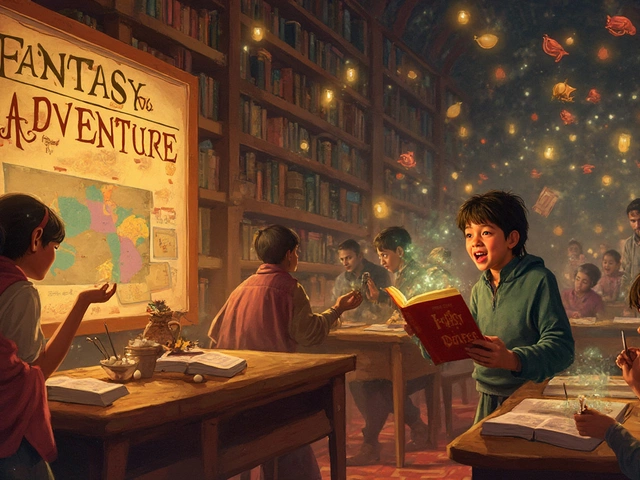
Fantasy books aren’t just about dragons, epic battles, or ancient magic—they’re about the worlds we escape to when real life feels a bit much. But when you start wondering which fantasy series stands on top, there’s more to it than just counting all the cool covers on someone’s shelf.
Sales numbers tell part of the story. Sometimes though, massive fan obsession or pop culture buzz creates legends out of books you never thought would go viral. Ever see adults race each other at midnight to grab new Harry Potter releases? Or friends get into heated arguments about whether Frodo or Jon Snow had it worse? That’s more than just sales—it’s a whole culture.
If you’re new to fantasy, or a lifelong fan wanting to see where your favorite series stacks up, you’re in the right spot. We’ll lay out what really makes a series successful, not just in dollars, but in the way people connect with the stories and talk about them, years or even decades later. And if you’re looking to start a new series, stick around for tips on choosing a world you’ll actually want to live in for weeks on end.
- What Does 'Most Successful' Really Mean?
- Comparing the Big Names: Sales, Influence, and Fandom
- Surprising Contenders and Why They Matter
- Tips for Diving Into the Best Fantasy Worlds
What Does 'Most Successful' Really Mean?
When people argue about which fantasy series is the most successful, they usually mean one (or more) of three things: which one sold the most, which one has the biggest influence on pop culture, or which one has the most hardcore fans. Spoiler alert: those answers aren’t always the same.
Let’s start with the numbers. Book sales are easy to track, and they give us a straight-up answer for popularity. For example, Harry Potter has sold over 600 million copies worldwide, which just blows almost everything else out of the water. Check out how the most famous fantasy series compare:
| Series | Estimated Sales (Millions) | First Published |
|---|---|---|
| Harry Potter | 600+ | 1997 |
| The Lord of the Rings | 150+ | 1954 |
| A Song of Ice and Fire | 90+ | 1996 |
| The Wheel of Time | 90+ | 1990 |
| Chronicles of Narnia | 100+ | 1950 |
But sales are only part of the story. Some series are so deeply rooted in our lives that you see references everywhere—Halloween costumes, online memes, even in how people name their kids. If you see someone with a lightning bolt scar or a “Winter is Coming” coffee mug, you know the books have hit classic status.
Success can also be about how much a series changes the game for writers and fans. The Lord of the Rings basically invented “epic fantasy” as we know it. Game of Thrones made a gritty, slow-burn fantasy world mainstream. And honestly, there are readers who’ve memorized entire family trees from The Wheel of Time just for fun. That level of loyalty counts for a lot.
So, when we say “most successful,” here’s what we’re really talking about:
- Sheer book sales and money made
- Lasting cultural impact—movies, TV shows, fan art, collectible merch
- Loyalty and obsession from readers of all ages
Keep these things in mind as you compare the heavy-hitters. It’s not just about numbers—it’s about which stories make people fall in love with fantasy and keep them coming back for more.
Comparing the Big Names: Sales, Influence, and Fandom
When it comes to fantasy novels, three titles usually dominate the conversation: Harry Potter, The Lord of the Rings, and A Song of Ice and Fire (better known as Game of Thrones for TV fans). These aren’t just popular—they’ve changed pop culture, spawned movies and shows, and built giant fan communities.
Here’s a quick look at the cold, hard numbers that actually set these series apart:
| Series | Total Sales (Approx.) | First Release | Major Adaptations |
|---|---|---|---|
| Harry Potter | 600 million+ | 1997 | 8 films, theme parks, stage play |
| The Lord of the Rings | 150 million+ | 1954 | Film trilogies, TV show, games |
| A Song of Ice and Fire | 90 million+ | 1996 | 8-season TV series, spinoffs |
Harry Potter isn’t just the best-selling fantasy series—it’s actually one of the best-selling book series, period. It landed in schools, libraries, and even on banned book lists. The movies turned unknown actors into celebrities. If you say “quidditch” or “Hogwarts,” pretty much everyone knows what you mean, whether they’re a super-fan or not.
The Lord of the Rings might seem old-school, but it pretty much set the rules for modern epic fantasy. J.R.R. Tolkien didn’t just write a story; he built whole languages and history for his world, and writers have been following his map ever since. The movies swept the Oscars and sparked a fresh wave of fantasy fandom, from fan art to memes to tabletop gaming.
A Song of Ice and Fire is a little newer but proved that grown-up, gritty fantasy could catch fire. The HBO adaptation dragged millions into a world where anyone could die at any moment, and "winter is coming" turned into a running joke worldwide. Even people who never read a fantasy novel in their lives got hooked on the show’s drama and twists.
But it’s not just about numbers or headlines. The real test is how these stories live on. There’s Harry Potter trivia nights, Tolkien cosplay at every major fan convention, and Game of Thrones tattoo contests. These worlds pull people together—they aren’t just books, they’re communities. That’s why, when we talk about the most successful fantasy series, we can’t ignore how huge and passionate these fandoms have become.

Surprising Contenders and Why They Matter
It’s easy to rattle off the obvious giants—JK Rowling, Tolkien, George R.R. Martin. But there are a few fantasy novels out there that have done ridiculously well, even if you don’t see them splashed on T-shirts at the mall. These series fly a little under the radar, yet their numbers and influence can leave you floored.
Take "The Wheel of Time" by Robert Jordan. Not only did it sell more than 90 million copies worldwide, but it also inspired a dedicated following way before Netflix turned it into a show. The series kept rolling with 14 hefty books (plus a prequel), and it’s a go-to recommendation if you want something with tons of depth and hundreds of characters to love—or hate.
Or look at "Discworld" by Terry Pratchett. Pratchett’s mix of satire and fantasy made it a hit, with more than 100 million copies sold across 41 books. The humor is sharp, but the world-building is just as strong as the big names—Discworld even gets its own stamps and conventions in the UK.
Let’s not forget Brandon Sanderson’s "Mistborn" and "The Stormlight Archive." Sanderson is probably the best-known fantasy author of the last ten years, with over 40 million books sold from the "Cosmere" universe by 2024. According to Tor Books, Sanderson’s 2022 Kickstarter for a set of new books raised $41 million—the highest funded Kickstarter for any book project, ever.
Series like "Shannara" by Terry Brooks also matter. Brooks pumped out over 30 books in the same world, and while critics have mixed feelings, fans snapped up over 25 million copies, helping mainstream fantasy long before "Game of Thrones" hit TV.
| Series | Estimated Copies Sold | Books in Series | Noteworthy Fact |
|---|---|---|---|
| The Wheel of Time | 90+ million | 14 (+1 prequel) | Amazon TV adaptation |
| Discworld | 100+ million | 41 | Inspired national stamps/conventions |
| Mistborn (Cosmere Universe) | 40+ million | Multiple connected series | Record-breaking Kickstarter in 2022 |
| Shannara | 25+ million | 30+ | First fantasy on New York Times bestseller list post-Tolkien |
So why do these series matter? For starters, they prove that fantasy isn’t all dragons and castles—it can be funny, political, deeply emotional, or just plain weird. Many of these reads have inspired new writers, shaped gaming worlds, and even changed the way publishers look for the “next big thing.” If you’re hunting for something fresh, or you think you’ve read everything, checking out one of these contenders is a solid move.
Tips for Diving Into the Best Fantasy Worlds
If you’re looking to jump into fantasy novels and not sure where to start, you’re not alone. The giant worlds, complex plots, and piles of books can feel overwhelming. Let’s break it down with some practical tips and real examples to help make your trip into fantasy series as smooth (and fun) as possible.
Fantasy novels range from short and sweet series to massive multi-book sagas. Take Harry Potter: Seven books, all finished—totally binge-able. Contrast that with The Wheel of Time, which rolls on for 14 main books plus a prequel. Here’s a quick table comparing popular series and their length so you know what you’re signing up for:
| Series | Number of Books | Total Pages (approx) | Status |
|---|---|---|---|
| Harry Potter | 7 | 4,100 | Finished |
| The Lord of the Rings | 3 (+ The Hobbit) | 1,200 | Finished |
| A Song of Ice and Fire | 5 (planned 7) | 4,800 | Ongoing |
| The Wheel of Time | 15 | 11,700 | Finished |
| The Witcher | 8 | 3,200 | Finished |
As you can see, some series are a weekend binge, others are a serious time investment. Tip one: check how many books are in the series and whether the story is actually finished. If waiting for new books drives you nuts, stick with ones that are done.
Next, think about the flavor you’re in the mood for. Fancy something light and magical? Harry Potter or Percy Jackson hit that spot. Want political scheming and unexpected deaths? Go straight for A Song of Ice and Fire. Interested in epic world-building with deep lore? Tolkien’s your guy with The Lord of the Rings.
- If you want something modern and quick, try series like Mistborn by Brandon Sanderson. The first trilogy is just three books. The writing is sharp and the magic system feels like something totally new.
- Urban fantasy fans—check The Dresden Files by Jim Butcher. It’s got wizards, detective stories, and is set in modern Chicago. Easy to get into and packed with action.
- For audiobooks, look up narrators like Michael Kramer (did The Wheel of Time and Mistborn). Great narration can make dense books way more fun.
It’s also fine to start with movie or TV adaptations—even loyal readers started there. Game of Thrones brought loads of new fans to the books, even if the series isn’t finished yet. Just know the books often have way, way more detail and side stories.
And here’s a reality: it’s okay to put a book down if it’s not clicking. Not every series works for everyone, no matter the hype. Sample a few chapters, maybe borrow from the library first. Find the world that pulls you in, not the one everyone says you have to love.


